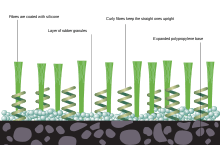Artificial turf–cancer hypothesis
Artificial turf is surface of synthetic fibers resembling natural grass. It is widely used for sports fields for being more hard-wearing and resistant than natural surfaces. Most use infills of crumb rubber from recycled tires, which use is controversial because of concerns that the tires contain carcinogens.[1]

Studies
An unpublished study by Rutgers University examined crumb rubber from synthetic fields in New York City. It found six possibly carcinogenic polycyclic aromatic hydrocarbons at levels excessive to state regulations. The researchers warned that the findings could have been made inaccurate by solvent extraction used to release the chemicals from the rubber.[2]
In a statistical study of the list of soccer players with cancer provided by UW coach Amy Griffin, public health researchers for the State of Washington found that the rates of cancer were actually lower than was estimated for the general population. While they did not state any conclusions on the safety of this form of artificial turf, they did recommend that players not restrict their play due to the presumed health benefits of being active. [3]
In late 2015, the United States Congress' House Energy and Commerce Committee ordered for the Environmental Protection Agency (EPA) to investigate a link. EPA, the Consumer Product Safety Commission and the Centers for Disease Control and Prevention are investigating.[4]
Testimonies
Nigel Maguire, formerly a chief executive for the National Health Service in Cumbria, claims that his son, a goalkeeper, could have developed Hodgkin's lymphoma by playing on an artificial surface. He has called for a ban on the surfaces, saying "It is obscene so little research has been done."[5]
In 2014, Amy Griffin, soccer coach at the University of Washington, surveyed American players of the sport who had developed cancer. Of 38 players, 34 were goalkeepers, a position in which diving to the surface makes accidental ingestion or blood contact with crumb rubber more likely, Griffin has asserted. Lymphoma and leukemia, cancers of the blood, predominated.[6]
Sports organizations
FIFA, the world governing body of association football (soccer), has stated that the evidence weighs in favour of artificial pitches being safe. The Football Association of England stated in February 2016 that they were observing reports and conducting their own research on the issue.[5]
References
- Hughes, Geraint (3 February 2016). "Report claims link between 3G pitches and cancer". Sky Sports. Retrieved 17 February 2016.
- "Laboratory Identification of Compounds Released from Tire Crumbs and Rubber Mulch". Environment and Human Health Inc. Retrieved 16 February 2016.
- "Investigation of Reported Cancer Among Soccer Players in Washington State" (PDF). Washington State Derpartment of Health. Retrieved 23 March 2018.
- Ozanian, Mike (13 February 2016). "Government Finally To Look Into Possible Link Between Artificial Turf And Cancer". Forbes.com. Retrieved 16 February 2016.
- "Fake football pitches gave my teenage son cancer, says former NHS boss". The Daily Telegraph. 15 February 2016. Retrieved 16 February 2016.
- Rappleye, Hannah (8 October 2014). "How Safe Is the Artificial Turf Your Child Plays On?". NBCNews.com. NBCUniversal Media, LLC. Retrieved 16 February 2016.